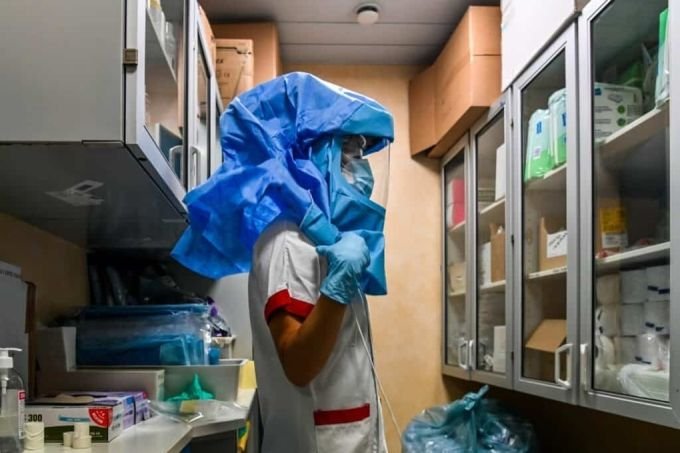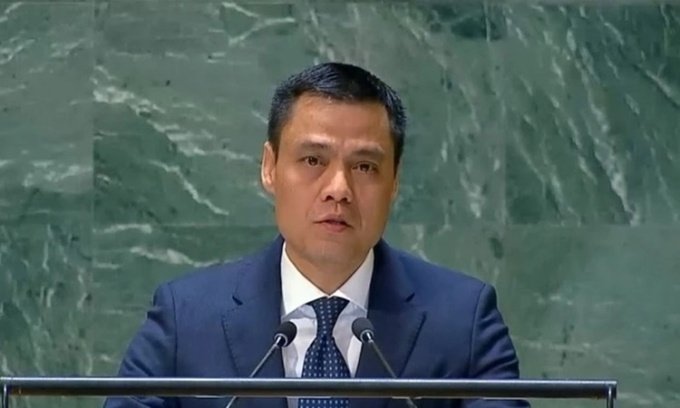The world recorded 64,783,598 cases of infection and 1,497,883 people died from nCoV, an increase of 667,967 and 13,087 cases in one day, respectively, while 44,888,811 people have recovered, according to real-time update site Worldometers
A nurse wears protective gear before entering the Covid-19 patient treatment area at a hospital in Rome, Italy on November 24.
The US, the largest epidemic region in the world, recorded 178,427 additional cases and 2,314 deaths in the past 24 hours, bringing the total number of infections to 14,069,037, of which 276,448 people have died.
According to the University of Washington’s Institute for Health Metrics and Evaluation, the average number of deaths per month from Covid-19 in the US is expected to nearly double in December, to more than 70,000, then continue to increase.
COVID Tracking Project, a project that monitors the epidemic situation by volunteers, said the number of people treated in US hospitals for Covid-19 exceeded 100,000 for the first time on December 2.
This number is nearly double what it was in the spring, during the first wave of infections.
The Centers for Disease Control and Prevention (CDC) on December 2 recommended shortening the quarantine period for people exposed to people infected with nCoV from 14 to 10 days if they have not been tested and have no symptoms.
The quarantine period can be reduced to just 7 days if the person tests negative.
India, the second largest epidemic area in the world, reported an additional 31,585 cases of infection and 469 deaths, bringing the total number of people infected and dead from Covid-19 to 9,531,295 and 138,628 respectively.
The capital New Delhi is going through the worst phase of the pandemic, with many hospitals falling into overload.
Indian Prime Minister Narendra Modi last weekend visited vaccine production facilities, emphasizing the importance of Covid-19 vaccines in pandemic control.
However, Rajesh Bhushan, a senior official at India’s Ministry of Health, said yesterday that `the government has never talked about nationwide vaccination`, explaining that it only needs to vaccinate a certain number of people.
Brazil, the third largest epidemic area in the world, recorded 653 more deaths from nCoV, bringing the total number of deaths to 174,515.
The average number of new infections in Brazil has increased from 10,000 cases/day in early November to more than 50,000/day, while the number of deaths per day increased nearly 9 times in just one week.
State governors and opposition politicians are urging President Jair Bolsonaro’s government to create a national vaccination plan.
France, the 5th largest epidemic area in the world, reported 2,244,635 cases of infection and 53,816 deaths after recording 14,064 and 310 additional cases, respectively.
The government has eased the second nationwide Covid-19 blockade, imposed from October 30, by allowing all shops to reopen on the weekend.
The UK reported an additional 16,170 cases and 603 deaths, bringing cases and deaths to 1,643,086 and 59,051 respectively.
The British Parliament yesterday continued to approve a regional Covid-19 control plan, forcing more than 40% of the population to be subject to strict restrictions, despite the opposition of dozens of parliamentarians in the Conservative Party.
Germany recorded 14,156 new infections and 329 new deaths, bringing the total to 1,069,763 and 16,862 respectively.
Germany’s response to the first wave of Covid-19 was highly appreciated, but after relaxing epidemic prevention measures when the second wave hit Europe, the number of infections recorded was quite significant.
Russia, the world’s fourth largest epidemic region, recorded an additional 25,345 cases of nCoV infection and 589 deaths within 24 hours, bringing the total to 2,347,401 and 41,053 respectively.
However, Russian Prime Minister Mikhail Mishustin said the pandemic is still quite serious in many regions across the country, the most worrying being Kaliningrad and St Petersburg.
Putin yesterday requested that Sputnik V vaccination be deployed on a large scale from next week.
Iran, one of the largest epidemic areas in the Middle East, reported 48,990 deaths, an increase of 362, out of a total of 989,572 cases, an increase of 13,621.
Iran’s Deputy Health Minister Alireza Raisi said the public’s compliance with epidemic prevention measures has increased to 90%.
After a period of stability, South Korea is facing the third wave of Covid-19 as new daily infections continue to increase sharply.
South Korean officials said on November 29 that Prime Minister Chung Sye-kyun would discuss with health officials about applying stricter social distancing measures to prevent Covid-19.
In Southeast Asia, Indonesia is the largest epidemic area in the region with 549,508 cases, an increase of 5,533, of which 17,199 people died, an increase of 118.
Indonesian President Joko Widodo announced in mid-November that the country intends to mass vaccinate medical staff and other frontline workers from December, to curb the epidemic and support economic recovery.
The Philippines reported 434,357 cases of infection and 8,436 deaths, an increase of 1,438 and 18 cases respectively, making it the second largest epidemic area in the region.
The Philippine government had previously negotiated with a number of potential Covid-19 vaccine manufacturers, from the US, Russia and China.
WHO on December 2 advised the public to wear non-medical masks indoors, such as in stores, shared workplaces, schools, if the space is not sufficiently ventilated, regardless of whether they can maintain a safe distance.
WHO also recommends that the public wear masks outdoors when it is not possible to maintain a distance of at least one meter from each other.










